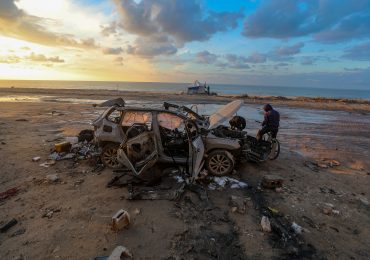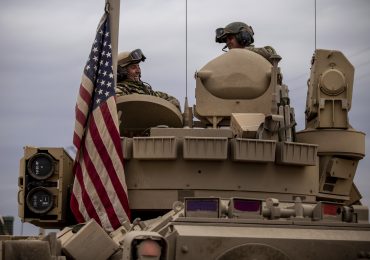Ever since the derailment of a freight train and its aftermath last year in East Palestine, Ohio, Americans have been awakened to the troubled reality of rail safety. While the headlines around that incident have faded, the Biden Administration’s commitment to action has not. When President Biden visited, his message to the community was clear: we will stay as long as it takes, we will continue to hold Norfolk Southern accountable, and we will push the entire industry to be safer.
[time-brightcove not-tgx=”true”]
The thing I remember best from my own visit to East Palestine is the decency and resilience of the residents who were working in and around the nearby church that doubled as a community response center. Since that visit, I’ve kept up with some of those I met on that trip. Again and again, two themes ring clear: their determination not to be defined by this derailment, and their insistence that the community‘s experience not be forgotten. Holding in mind the voices of East Palestine and of every American community that sits along a railroad, I have spent the year since that incident challenging the rail industry, Congress, and our own Department to do everything possible to make our railroads safer.
My Department has pushed forward on safety measures, including last week’s major announcement that our Federal Railroad Administration finalized a long-sought rule to establish minimum safety requirements for the size of train crews. Most Americans would be surprised to learn that before this rule, there was nothing to prevent a railroad from unilaterally reducing the crew size aboard a train to just one person—even on a two-mile-long train—without even notifying our Department. Fixing this has long been a railroad safety priority, and despite industry opposition, it is finally a reality.
This is just the latest step that we have taken with the authorities we have as an administration. From the first days of the Biden Administration, and with renewed urgency since the Norfolk Southern derailment in East Palestine, we have used our funding and regulatory authority to improve safety and force railroad companies to do better.
In addition to the safe crew size rule we just finalized, our Federal Railroad Administration has completed 7,500 focused inspections along high-hazard flammable train routes. We’ve issued safety advisories and advanced policies to make operations safer, addressing tank car types, train lengths, hazmat spills, and worker protections.
We developed a new rule to require railroads to provide real-time information to first responders when a hazmat incident occurs—and we made $30 million available to support training for first responders.
Meanwhile, we have been using the resources of the Biden infrastructure package to improve the physical infrastructure of America’s rail networks. Under President Biden’s leadership, we have awarded billions to modernize rail infrastructure and improve hundreds of dangerous highway-rail crossings.
We’ve also taken action to help improve conditions for those working in the industry. And after significant pressure on industry from President Biden, labor unions, and our department, approximately 89% of Class I freight railroad workers now have paid sick days, up from less than 5% around a little more than a year ago.
While we are proud of this ongoing work, the reality is that many important changes cannot happen without legislative change—which is why I am urgently renewing my call on Congress to step up.
Just over a year ago, in the wake of the East Palestine disaster, the bipartisan Railway Safety Act was introduced in Congress, with support from our administration. Yet the law has been stalled ever since by the railroad industry lobby and its Congressional allies.
This legislation is long overdue. It would phase in safer tank cars, require defect detectors, expand the list of hazardous materials that qualify for stricter safety precautions, and more.
The provisions of this law are commonsensical. For example, under existing law, the maximum fine we can impose—even for an egregious rail safety violation that gets someone killed—is less than $250,000. This is a trivial sum for a railroad corporation posting profits in the billions each year. In other areas, like airline passenger protection, our administration has demonstrated that fines can change the behavior of corporations—but only if they are tough enough. The Railway Safety Act would increase the cap on fines against railroads so that they can actually change the companies’ approach.
This provision, and many others in the proposed new law, would give us a stronger hand to keep Americans safe and hold industry to a higher standard. It would save lives.
The railroad industry is aggressively lobbying against the legislation. And some of the same Republican Representatives and Senators who were loudest in professing outrage over the derailment one year ago have gone uncharacteristically silent on the subject, now that their votes are needed to pass it into law.
It doesn’t have to be this way. At other moments in the past, Congress has demonstrated the capacity to stand up to the multi-billion-dollar railroad corporations and enact meaningful safety reforms. The early part of this century saw a number of high-profile freight rail incidents across the U.S. and Canada, including mass-casualty incidents like one in Quebec that left 47 people dead and leveled a town, and another in South Carolina that killed ten people and sent hundreds to the hospital with chlorine exposure. Those events led to significant new rail safety changes—with real results, including a reduction in derailments.
But as attention faded on those incidents, the railroad industry was consistently able to weaken or delay important safety provisions. Today, while lower than it was at its peak, the rate of derailments remains unacceptable. America has averaged multiple train derailments per day for as long as I’ve been alive. It is an unacceptable status quo.
Experience has shown that freight railroading, which is an immensely profitable business, will be better off when the country holds it to a higher standard. The Biden Administration is taking every needed step that does not require an Act of Congress—but now Congress must act.
The choice is clear: Congress can side with the railroad industry lobby that wants to water down efforts to strengthen safety requirements, or it can step up and pass the Railway Safety Act.
We owe this to the people of East Palestine, who have long been calling for this legislation to pass. If we get this right, their community will be known not only for the derailment that upended everyday life there, but for the lifesaving reforms that came next.
Leave a comment








